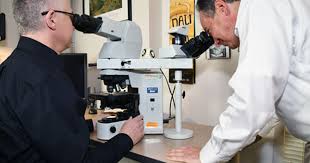Source: militarytimes.com
A team of researchers at the James A. Haley Veterans’ Hospital in Tampa, Florida, is revolutionizing the way cancer is documented by enlisting the help of a computer to diagnose the disease in one of the largest patient populations in the nation: veterans.
Sophisticated artificial intelligence is capable of drastically altering how cancer is diagnosed and treated by learning to distinguish imagery of tissue containing cancerous cells from pictures of healthy tissue, a recent study in the Federal Practitioner journal claims.
“Based on a set of images selected to represent a specific tissue or disease process, the computer can be trained to evaluate and recognize new and unique images from patients and render a diagnosis,” the study’s authors wrote.
To test machine learning software, researchers uploaded hundreds of microscopic images of commonly diagnosed forms of the disease, such as lung or colon cancer, along with pictures of non-cancerous cells. At the conclusion of the test, the software — both Google- and Apple-based versions were tested — not only distinguished cancerous cells from non-cancerous tissue with a success rate of better than 90 percent, but it also indicated the exact form of cancer it was analyzing.
The ability of user-friendly machine learning software to learn and efficiently perform traditional human tasks in less time will alleviate some of the demand on medical practitioners who are already being stretched thin, the authors claim.
By coupling AI with a growing list of telehealth options, specialists have the potential to reach patients from anywhere in the world. Greater accessibility would especially benefit the millions of patients in the VA’s healthcare system, many of whom live in remote, rural areas where specialists or facilities needed to treat unique diseases are scarce at best.
A collaborative doctor-AI system can also diminish patient wait times and effectively eliminate the time-consuming paperwork analysis that has always bogged down practitioners. What it won’t do, according to one of the study’s authors, is replace its Homo sapien counterparts.
“Our ultimate goal would be to create programs that can be rolled out in the entire VA system so that pathologists who are working solo, or maybe there are two pathologists in some small VAs, would have the benefit of having something that is helping them become more productive, help them prioritize the workload and improve quality,” Dr. Andrew Borkowski said in a VA release.
And while the hope of machine learning enthusiasts is to eventually apply AI-assisted healthcare on a global scale, early testing using the VA’s expansive patient base allows for the mining of data from a seemingly limitless source.
The myriad imagery generated from the nearly 50,000 cancer diagnoses of veterans each year, for example, will enable AI software to analyze more data, learn faster, and expand application to other demographics and diseases at a pace other healthcare systems cannot match.
All this is not to say there won’t be obstacles to overcome before AI can be considered entirely viable — ensuring the impeccable accuracy of its decision-making paramount among them.
In 2019, Google-run AI software was fed hundreds of images and tested to determine whether it could predict the early onset of a deadly kidney disease. Two of every three AI-generated results yielded false positives. Significant diagnostic errors like that can be detrimental to practitioners who then follow up on phantom diseases using valuable time that could be spent treating patients in dire need, Mildred Cho, associate director of the Stanford Center for Biomedical Ethics, told WUSF News.
Continued success in machine learning trials like the one at the James A. Haley Veterans’ Hospital, however, bode well for AI’s future implementation into healthcare. Researchers hope continuously evolving software, such as Apple-produced AI that is now capable of recognizing images that have been rotated, flipped, or cropped, will help alleviate a glaring industry-wide trend.
The “number of pathologists in the U.S. is dramatically decreasing, and many other countries have marked physician shortages, especially in fields of specialized training such as pathology,” the study’s authors wrote. “These models could readily assist physicians in underserved countries and impact shortages of pathologists elsewhere by providing more specific diagnoses in an expedited manner.”
Future application of machine learning AI, the study concluded, will be immeasurably beneficial in diagnosing and documenting everything from various forms of cancer to non-cancerous diseases, brain hemorrhages, blood disorders, infections, and inflammatory issues.
“The potential of these technologies to improve health care delivery to veteran patients seems to be limited only by the imagination of the user.”
